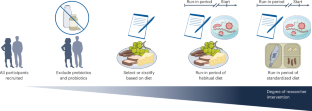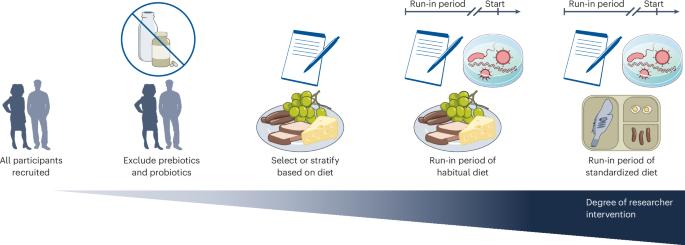从饮食和肠道微生物组的角度设计和报告益生菌和益生菌临床试验
IF 20.5
1区 生物学
Q1 MICROBIOLOGY
引用次数: 0
摘要
饮食是胃肠道微生物组组成和功能的主要决定因素,但我们对饮食如何影响益生菌和益生菌功效的了解却很有限。在此,我们研究了目前人类研究中饮食对益生元和益生菌功效影响的证据,包括潜在的机制。我们建议将习惯性饮食作为变量纳入益生菌和益生元干预研究中。这一建议是基于饮食可直接或通过肠道微生物组影响研究结果的潜在机制。在此背景下,我们考虑了膳食评估的挑战和机遇。最后,我们为益生元和益生菌(以及其他生物干预)人体临床试验的设计、实施和报告提供了建议,以考虑膳食和营养的任何影响。本文章由计算机程序翻译,如有差异,请以英文原文为准。


Design and reporting of prebiotic and probiotic clinical trials in the context of diet and the gut microbiome
Diet is a major determinant of the gastrointestinal microbiome composition and function, yet our understanding of how it impacts the efficacy of prebiotics and probiotics is limited. Here we examine current evidence of dietary influence on prebiotic and probiotic efficacy in human studies, including potential mechanisms. We propose that habitual diet be included as a variable in prebiotic and probiotic intervention studies. This recommendation is based on the potential mechanisms via which diet can affect study outcomes, either directly or through the gut microbiome. We consider the challenges and opportunities of dietary assessment in this context. Lastly, we provide recommendations for the design, conduct and reporting of human clinical trials of prebiotics and probiotics (and other biotic interventions) to account for any effect of diet and nutrition. Here the authors make recommendations for the design of clinical trials for prebiotics and probiotics that includes consideration of diet and the gut microbiome.
求助全文
通过发布文献求助,成功后即可免费获取论文全文。
去求助
来源期刊

Nature Microbiology
Immunology and Microbiology-Microbiology
CiteScore
44.40
自引率
1.10%
发文量
226
期刊介绍:
Nature Microbiology aims to cover a comprehensive range of topics related to microorganisms. This includes:
Evolution: The journal is interested in exploring the evolutionary aspects of microorganisms. This may include research on their genetic diversity, adaptation, and speciation over time.
Physiology and cell biology: Nature Microbiology seeks to understand the functions and characteristics of microorganisms at the cellular and physiological levels. This may involve studying their metabolism, growth patterns, and cellular processes.
Interactions: The journal focuses on the interactions microorganisms have with each other, as well as their interactions with hosts or the environment. This encompasses investigations into microbial communities, symbiotic relationships, and microbial responses to different environments.
Societal significance: Nature Microbiology recognizes the societal impact of microorganisms and welcomes studies that explore their practical applications. This may include research on microbial diseases, biotechnology, or environmental remediation.
In summary, Nature Microbiology is interested in research related to the evolution, physiology and cell biology of microorganisms, their interactions, and their societal relevance.
 求助内容:
求助内容: 应助结果提醒方式:
应助结果提醒方式:


